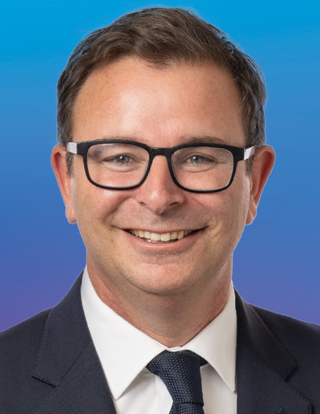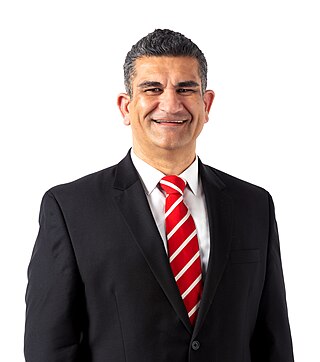
Donna Lynn Awatere Huata is a former member of the New Zealand Parliament for the ACT New Zealand Party, activist for Māori causes, and convicted fraudster.

Richard William Prebble is a former member of the New Zealand Parliament. Initially a member of the Labour Party, he joined the newly formed ACT New Zealand party under Roger Douglas in 1996, becoming its leader from 1996 to 2004.
Muriel Newman is a former New Zealand politician for the ACT New Zealand party. She was a member of the New Zealand Parliament from 1996 until 2005, when she was not re-elected.

Judith Ngaire Tizard is a former New Zealand politician, and a member of the Labour Party.

Susan Jane Kedgley is a New Zealand politician, food campaigner and author. Before entering politics Kedgley worked for the United Nations in New York for 8 years and for a decade as a television reporter, director and producer in New Zealand.
Owen Jennings is a former New Zealand politician. He was a Member of Parliament from 1996 to 2002, representing the ACT New Zealand party.

Anne Merrilyn Tolley is a New Zealand politician.
Richard James Gerard is a former New Zealand politician. He was a National Party Member of Parliament from 1984 to 1997.

Peter McCardle, is a New Zealand politician. He was a Member of Parliament from 1990 to 1999, first as a member of the National Party, then as a member of New Zealand First, and finally as an independent. McCardle was deputy mayor of Upper Hutt from 2007 to 2013.

Dame Frances Helen Wilde is a New Zealand politician, and former Wellington Labour member of parliament, Minister of Tourism and Mayor of Wellington. She was the first woman to serve as Mayor of Wellington. She was chairperson of the Greater Wellington Regional Council from 2007 until 2015, and since 2019 she has chaired the board of the Museum of New Zealand Te Papa Tongarewa.

Epsom is a New Zealand electorate in Auckland, returning one Member of Parliament to the New Zealand House of Representatives. Since the 2014 general election, Epsom has been represented by David Seymour, the leader of the ACT Party.

Helensville was a New Zealand parliamentary electorate in the Auckland region, returning one Member of Parliament to the House of Representatives. The electorate was first established for the 1978 election, was abolished in 1984, and then reinstated for the 2002 election. The seat was won and held by John Key through his term as prime minister. Chris Penk of the National Party held the seat from the 2017 general election until its abolition in 2020, when it was replaced with the new Kaipara ki Mahurangi electorate, which Penk also retained.

Andrew Bruce Forbes Williams is a New Zealand former politician. In 2007 he won election as Mayor of North Shore City. Williams served on a community board during 2004–2007, and as a city councillor in the term before that in 2001–2004. North Shore City Council was abolished in October 2010, becoming part of the Auckland "Super City". Williams won election to the New Zealand Parliament on 26 November 2011 as a list MP for the New Zealand First Party, but only served one term.

Princes Street Labour is a branch of the New Zealand Labour Party in Auckland.

New Zealand has a unitary system of government in which the authority of the central government defines sub-national entities. Local government in New Zealand has only the powers conferred upon it by the New Zealand Parliament. Under the Local Government Act 2002, local authorities are responsible for enabling democratic local decision-making and promoting the social, economic, environmental, and cultural well-being of their communities, as well as more specific functions for which they have delegated authority.

Cameron Eric Brewer is a New Zealand politician and Member of Parliament in the House of Representatives for Upper Harbour from the National Party since the 2023 New Zealand general election.

The 2016 New Zealand local elections were triennial local elections to select local government officials and District Health Board members. Under section 10 of the Local Electoral Act 2001, a "general election of members of every local authority or community board must be held on the second Saturday in October in every third year" from the date the Act came into effect in 2001, meaning 8 October 2016.

An election was held for the Mayor of Auckland in September and October 2016, closing on 8 October, as part of the 2016 Auckland local government elections. Phil Goff was elected.

Tahere Paul Eagle is a New Zealand politician and former member of the New Zealand House of Representatives for the Rongotai electorate from 2017 to 2023. He was a Wellington City Councillor from 2010 to 2017 and was the first person of Māori descent to be Deputy Mayor of Wellington, but was defeated in a landslide when he sought the mayoralty as an independent candidate in 2022.

Helene Ruth Paula Ritchie is a former local body politician, registered psychologist and mediator, and a board member from Wellington, New Zealand. As Wellington's longest serving City Councillor of over 30 years, she led the Labour team to a majority position on the council. Later, she was the first female deputy mayor and chaired the Wellington Airport Authority and its successor for eight years.















